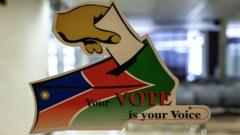In a tumultuous year for African governance, countries like Namibia, Botswana, and Senegal are witnessing significant electoral contests resulting in substantial losses for ruling parties. Factors contributing to this change include growing public dissatisfaction with corruption and economic hardship, pushing opposition parties into stronger positions.
Resurgence of Opposition: A Year of Electoral Challenges for African Incumbents

Resurgence of Opposition: A Year of Electoral Challenges for African Incumbents
Across sub-Saharan Africa, established political parties are experiencing unprecedented electoral defeats, signaling a shift toward greater democratic engagement and public accountability.
Article Text:
In 2024, the political landscape in sub-Saharan Africa has been dramatically reshaped, with incumbent parties facing unprecedented identification from voters. Namibian ruling party Swapo, despite securing 57% of the presidential vote for Netumbo Nandi-Ndaitwah—the country's first female leader—has seen its control significantly challenged. The elections were marred by logistical issues and allegations of irregularities, raising questions about the legitimacy of Swapo's increased presidential support compared to its dismal performance in parliamentary elections.
This year has been characterized as an "annus horribilis" for several governing parties throughout the region, highlighting a burgeoning trend of electoral challenges that have forced them to relinquish or lose significant political power. In Botswana, the long-dominant Botswana Democratic Party (BDP) faced a staggering defeat in October, with only four seats secured in a parliament of 69, marking a new low in its political history.
Mauritius is another noteworthy case, where the governing Alliance Lepep could manage only 27% of the vote, reducing its representation from a majority in parliament to just two seats. The opposition Alliance du Changement decisively won 60 out of 66 seats—a radical shift indicative of public sentiment against the status quo.
Senegal's political scene also underwent a transformation with the swift release of opposition figures Bassirou Diomaye Faye and Ousmane Sonko from jail shortly before elections. Their subsequent victory illustrates how public pressure can pivot electoral results despite historical government control. Moreover, South Africa's African National Congress (ANC), while retaining power, experienced its lowest electoral result since apartheid ended, resulting in a coalition government that further blurs traditional party dominance.
The key themes driving this electoral shift include a combination of public frustration over economic mismanagement, corruption, and civil rights abuses. Citizens across Africa have demonstrated diminished tolerance for longtime ruling parties that failed to address pressing concerns. Skyrocketing prices for essential goods like food and fuel have exacerbated dissatisfaction, prompting protests in countries like Kenya that ultimately targeted government accountability.
This momentum for change is reflective of a larger global discontent, as seen in the recent political upheavals in the UK and the US linked to economic dissatisfaction. However, what sets Africa apart in these electoral changes is how opposition parties have strategically adapted, improving their mobilization and safeguarding electoral processes to ensure every vote counts. Noteworthy collaborations among opposition parties, such as the Umbrella for Democratic Change in Botswana, have empowered these parties to present a formidable challenge to ruling authorities.
Looking ahead, the electoral environment appears rocky for Ghana's New Patriotic Party and for the administration of Malawi's President Lazarus Chakwera in 2025. If Ghana also undergoes a significant political shift, it would mark five opposition victories across the continent within a single year—an unprecedented achievement.
As these noteworthy electoral patterns develop amidst a backdrop of global authoritarianism and democratic decline, they reveal Africa's underlying resilience and commitment to democracy. A growing collective of civil societies, citizens, and opposition groups are demanding accountability from their leaders and punish those deemed ineffective or corrupt.
International observers must acknowledge this trend as Africa becomes a beacon of potential democratic restoration, countering the idea of entrenched authoritarianism. The recent elections reflect a region that, despite its challenges, is taking large strides toward a more engaged and accountable governance landscape.
In 2024, the political landscape in sub-Saharan Africa has been dramatically reshaped, with incumbent parties facing unprecedented identification from voters. Namibian ruling party Swapo, despite securing 57% of the presidential vote for Netumbo Nandi-Ndaitwah—the country's first female leader—has seen its control significantly challenged. The elections were marred by logistical issues and allegations of irregularities, raising questions about the legitimacy of Swapo's increased presidential support compared to its dismal performance in parliamentary elections.
This year has been characterized as an "annus horribilis" for several governing parties throughout the region, highlighting a burgeoning trend of electoral challenges that have forced them to relinquish or lose significant political power. In Botswana, the long-dominant Botswana Democratic Party (BDP) faced a staggering defeat in October, with only four seats secured in a parliament of 69, marking a new low in its political history.
Mauritius is another noteworthy case, where the governing Alliance Lepep could manage only 27% of the vote, reducing its representation from a majority in parliament to just two seats. The opposition Alliance du Changement decisively won 60 out of 66 seats—a radical shift indicative of public sentiment against the status quo.
Senegal's political scene also underwent a transformation with the swift release of opposition figures Bassirou Diomaye Faye and Ousmane Sonko from jail shortly before elections. Their subsequent victory illustrates how public pressure can pivot electoral results despite historical government control. Moreover, South Africa's African National Congress (ANC), while retaining power, experienced its lowest electoral result since apartheid ended, resulting in a coalition government that further blurs traditional party dominance.
The key themes driving this electoral shift include a combination of public frustration over economic mismanagement, corruption, and civil rights abuses. Citizens across Africa have demonstrated diminished tolerance for longtime ruling parties that failed to address pressing concerns. Skyrocketing prices for essential goods like food and fuel have exacerbated dissatisfaction, prompting protests in countries like Kenya that ultimately targeted government accountability.
This momentum for change is reflective of a larger global discontent, as seen in the recent political upheavals in the UK and the US linked to economic dissatisfaction. However, what sets Africa apart in these electoral changes is how opposition parties have strategically adapted, improving their mobilization and safeguarding electoral processes to ensure every vote counts. Noteworthy collaborations among opposition parties, such as the Umbrella for Democratic Change in Botswana, have empowered these parties to present a formidable challenge to ruling authorities.
Looking ahead, the electoral environment appears rocky for Ghana's New Patriotic Party and for the administration of Malawi's President Lazarus Chakwera in 2025. If Ghana also undergoes a significant political shift, it would mark five opposition victories across the continent within a single year—an unprecedented achievement.
As these noteworthy electoral patterns develop amidst a backdrop of global authoritarianism and democratic decline, they reveal Africa's underlying resilience and commitment to democracy. A growing collective of civil societies, citizens, and opposition groups are demanding accountability from their leaders and punish those deemed ineffective or corrupt.
International observers must acknowledge this trend as Africa becomes a beacon of potential democratic restoration, countering the idea of entrenched authoritarianism. The recent elections reflect a region that, despite its challenges, is taking large strides toward a more engaged and accountable governance landscape.



















